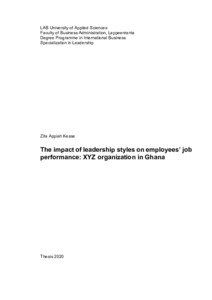The impact of leadership styles on employees' job performance : XYZ organization in Ghana
Kesse Appiah, Zita (2020)
Avaa tiedosto
Lataukset:
Kesse Appiah, Zita
2020
All rights reserved. This publication is copyrighted. You may download, display and print it for Your own personal use. Commercial use is prohibited.
Julkaisun pysyvä osoite on
https://urn.fi/URN:NBN:fi:amk-2020101821392
https://urn.fi/URN:NBN:fi:amk-2020101821392
Tiivistelmä
The thesis aimed to examine the impact of leadership styles in terms of employee’s job performance and to understand leadership from the viewpoint of employees. Additionally, the research work studied the leadership styles of non-governmental organizations (NGOs) in the private sector in a cross-cultural context with emphasis on Ghana.
A comprehensive literature review was applied to collect information about different leadership styles, theories, and employee performance. For the researcher to understand the employees’ perspective about the leadership style, a qualitative method was adopted where semi-structured questionnaires were applied to conduct an interview and surveys with the personnel from the XYZ organization. This method was adopted to ensure that employees feel free to answer more into detail questions presented to them.
The result shows that private NGOs must consider using democratic leadership, laissez-faire leadership, and transformational leadership style so they can boost the morale of their employees to improve on job performance. Furthermore, the culture which is vital in leadership style must be taken into consideration to help leaders know what kind of leadership style to adopt and when to adapt so they can promote integrity, credibility, and sustainability for the organization. Additionally, leaders must also consider implementing the right leadership style to foster a positive work environment, encourage continual communication and participation among employees, and improve the morale of employees of which will enhance job performance.
From the findings, the recommendation is that private NGOs should invest in leadership development programs to groom remarkable leadership abilities for the future. This finding will be beneficial to people seeking to improve their leadership styles in both private NGOs and other organizations.
A comprehensive literature review was applied to collect information about different leadership styles, theories, and employee performance. For the researcher to understand the employees’ perspective about the leadership style, a qualitative method was adopted where semi-structured questionnaires were applied to conduct an interview and surveys with the personnel from the XYZ organization. This method was adopted to ensure that employees feel free to answer more into detail questions presented to them.
The result shows that private NGOs must consider using democratic leadership, laissez-faire leadership, and transformational leadership style so they can boost the morale of their employees to improve on job performance. Furthermore, the culture which is vital in leadership style must be taken into consideration to help leaders know what kind of leadership style to adopt and when to adapt so they can promote integrity, credibility, and sustainability for the organization. Additionally, leaders must also consider implementing the right leadership style to foster a positive work environment, encourage continual communication and participation among employees, and improve the morale of employees of which will enhance job performance.
From the findings, the recommendation is that private NGOs should invest in leadership development programs to groom remarkable leadership abilities for the future. This finding will be beneficial to people seeking to improve their leadership styles in both private NGOs and other organizations.
